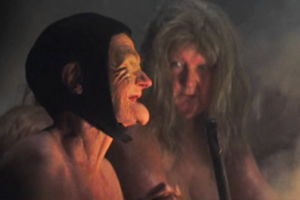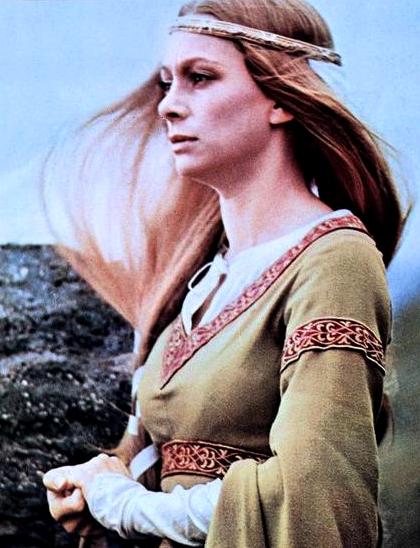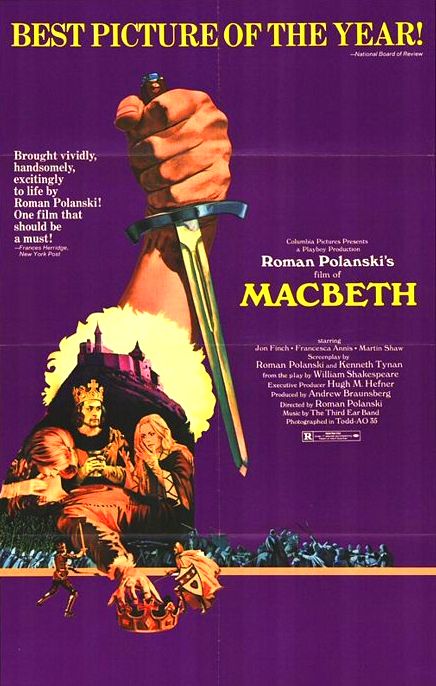
“Life is a tale told by an idiot, full of sound and fury, signifying nothing.” – Macbeth
The rare occasion where a film is so determinedly pessimistic it works all the better for it. Macbeth (1971) is Shakespeare adapted unlike any other, bleak and gory, muddy and swampy, boiled and blistered, a vision of hell on Earth. Everybody speaks in it like they got a case of the crazies. Too many Macbeths are noble and righteous, here we get a thane defined by reckless blind ambition. The coven of naked witches construct a prophecy that he will become King. Lady Macbeth will stir her husband’s wrath, and inspire a coup d’ etat. Once the Shakespearean wheels of destruction set forth they cannot be reversed. This was the film Roman Polanski (“Rosemary’s Baby”) made after his wife Sharon Tate was murdered by the Manson family, and you can feel an outpour of rage coming from his work.
Polanski’s 1971 interpretation is as out-there of a Shakespeare adaptation that exists. The text is nearly unabridged and full-verse – and sometimes not said in soliloquy but used as a voice-over inner monologue. The mood is unlike any other, psychotic and fatalistic. The players do not have any redeemable humanity to them, they live as if they expect to die shortly. The swordfights in this movie are like the first duels to the death that I ever saw, far more real than a “Musketeers” romp. Unflinchingly, this is a hopeless tale of shapeless, rapacious people on the verge of overthrowing civility. You can make a game out of point-picking the most level-headed among this society of smudged intelligence.
Attaining power takes a certain heedless audacity. Macbeth follows through on his destiny and kills Duncan (in close-up) to become King of Scotland. He spends the rest of his days constructing malice against those he fears will plot against him. The pillaging is very primitive in some scenes, beyond deplorable and nearly offensive the senses.
 The witches corral in the nude insanely, dropping repulsive guts and entrails into the cauldron. The camera looks into the cauldron. Polanski comes up with hallucinatory visions, but that mean what? It’s all so nightmarish with a voodoo-like power. We know that a paranoia of insurgents and evil forces is what preoccupies Macbeth’s subconscious fears. Yet I would think that there is more to it. Are all these characters’ under satanic possession? Is Macbeth the new Antichrist?
The witches corral in the nude insanely, dropping repulsive guts and entrails into the cauldron. The camera looks into the cauldron. Polanski comes up with hallucinatory visions, but that mean what? It’s all so nightmarish with a voodoo-like power. We know that a paranoia of insurgents and evil forces is what preoccupies Macbeth’s subconscious fears. Yet I would think that there is more to it. Are all these characters’ under satanic possession? Is Macbeth the new Antichrist?
 Photography took place as it was described in lore of the real Scottish king from which Shakespeare built his play on. Northumberland, was the primary locale, with additional shooting on the marshes of Wales. “Macbeth” became the only theatrical film produced by Hugh Hefner’s Playboy empire, and as a result, was lambasted for nude and grotesque sensationalism – even though Polanski insists such elements was his and co-scenarist Kenneth Tynan’s idea before funding ever became available. Polanski also takes credit for one of cinema’s most gnarly beheadings and head on a stick shots.
Photography took place as it was described in lore of the real Scottish king from which Shakespeare built his play on. Northumberland, was the primary locale, with additional shooting on the marshes of Wales. “Macbeth” became the only theatrical film produced by Hugh Hefner’s Playboy empire, and as a result, was lambasted for nude and grotesque sensationalism – even though Polanski insists such elements was his and co-scenarist Kenneth Tynan’s idea before funding ever became available. Polanski also takes credit for one of cinema’s most gnarly beheadings and head on a stick shots.
Starring Jon Finch as the destructive Macbeth, Francesca Annis as Lady Macbeth, John Stride as Ross, Martin Shaw as Banquo, Terrence Bayler as Macduff, and Nicholas Shelby as King Duncan. Available on Amazon.
140 Minutes. Rated R.
Film Cousins: “Throne of Blood” (1957, Japan); “Ran” (1985, Japan); “Richard III” (1995); “Hamlet” (1996).





